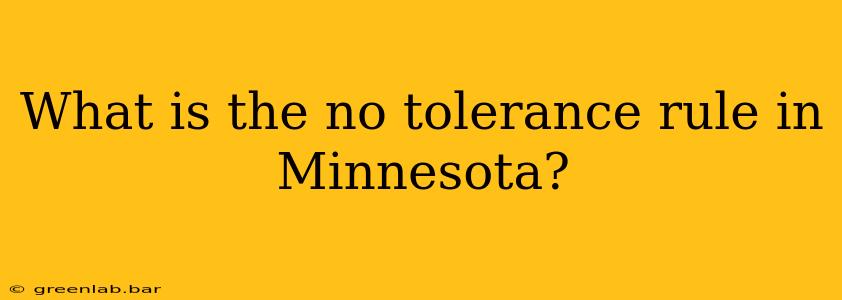Minnesota's "zero tolerance" or "no tolerance" laws are a set of regulations focusing primarily on underage drinking and driving, and, to a lesser extent, other offenses involving minors. These laws aim to deter risky behaviors and protect young people. However, the term "no tolerance" can be misleading, as there are nuances and exceptions within the legislation. This guide will clarify the specifics, helping you understand what constitutes a violation and its potential consequences.
Underage Drinking and Driving: The Core of Minnesota's No Tolerance Policy
The most prominent application of Minnesota's no-tolerance policy involves underage drivers with any detectable amount of alcohol in their system. This means even a trace amount of alcohol, however small, can result in severe penalties. This differs significantly from the legal limit for adult drivers, which allows for a certain blood alcohol content (BAC) level.
Key Aspects of Underage Drinking and Driving Laws:
- Zero BAC Limit: The core principle is a zero blood alcohol concentration (BAC) limit for drivers under the legal drinking age (21). Any detectable alcohol in the driver's system constitutes a violation.
- Administrative Penalties: Beyond criminal charges, administrative penalties are automatically imposed, such as license revocation or suspension. These penalties are separate from and in addition to potential court fines and other consequences.
- Vehicle Impoundment: In many cases, the vehicle involved in the offense may be impounded, resulting in additional costs and inconvenience for the driver and their family.
- Mandatory Classes and Programs: Completion of alcohol education and rehabilitation programs is frequently mandatory as part of the penalties imposed.
Consequences for Underage Drinking and Driving
The consequences are serious and can significantly impact a young person's future:
- License Suspension or Revocation: This can prevent the individual from driving legally for an extended period, affecting their ability to commute to school, work, or other activities.
- Fines and Court Costs: These financial penalties can be substantial, adding significant burden to the individual and their family.
- Community Service: As a part of sentencing, community service hours may be required.
- Criminal Record: A DUI conviction, even for underage drivers, will result in a criminal record, which can have long-term effects on employment, education, and other opportunities.
Beyond Underage Drinking and Driving: Other "No Tolerance" Applications
While underage drinking and driving are the primary focus, the term "no tolerance" might be loosely applied in other contexts involving minors, including:
- School Discipline: Some school policies might employ a "zero-tolerance" approach to certain offenses, such as drug possession or violence. These policies vary significantly between school districts and should be reviewed directly with the school administration.
- Specific Traffic Violations: Certain traffic violations, even without alcohol involvement, may have stricter penalties for underage drivers.
Seeking Legal Advice: Navigating No Tolerance Laws
If you or someone you know faces accusations related to Minnesota's no-tolerance laws, seeking legal counsel is crucial. An experienced attorney can explain the specifics of the charges, help you understand your rights, and represent you effectively during legal proceedings.
Disclaimer: This information is for educational purposes only and should not be considered legal advice. The specifics of Minnesota's no-tolerance laws are complex and can vary based on individual circumstances. Always consult with a qualified legal professional for advice tailored to your situation.

